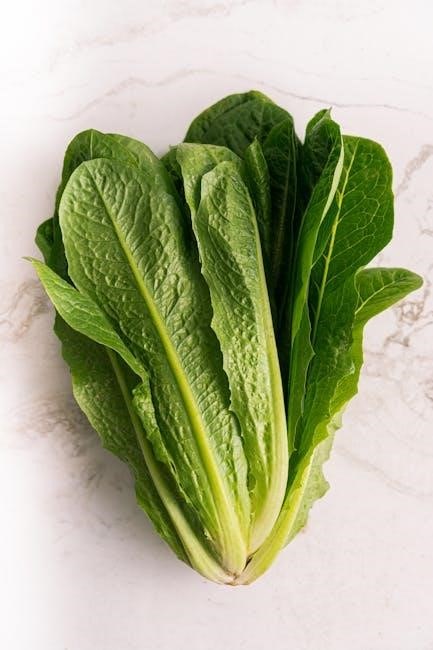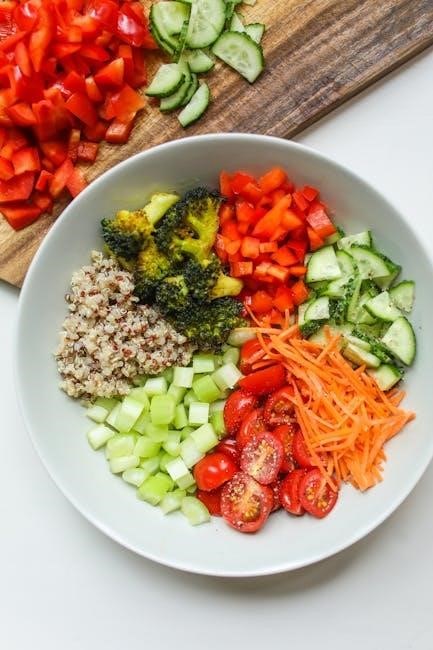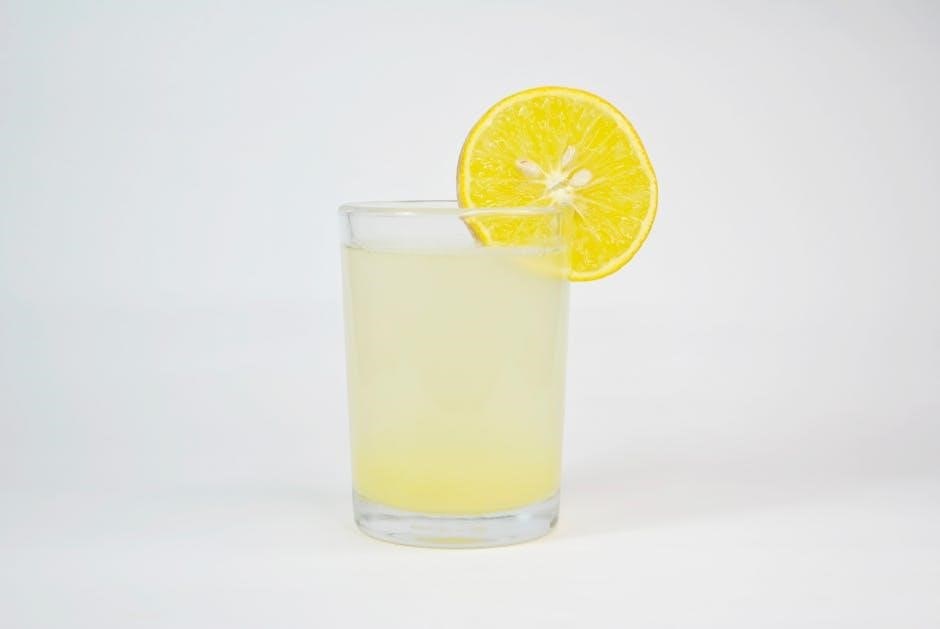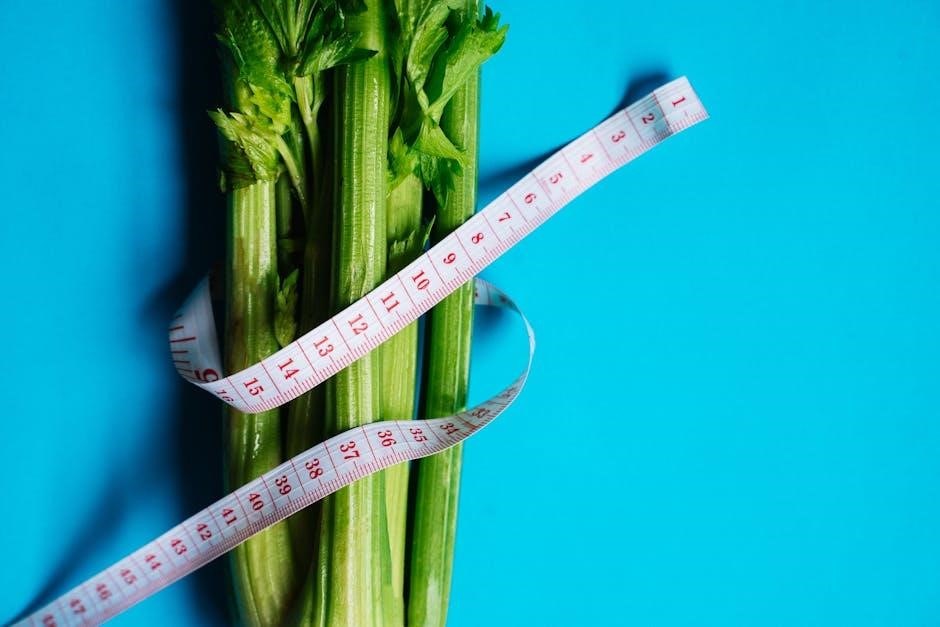Overview of the 21-Day Detox Diet Plan
The 21-Day Detox Diet Plan is a structured program designed to eliminate toxins and promote overall well-being through dietary modifications and lifestyle adjustments. It focuses on consuming whole foods, eliminating processed items, and supporting natural detoxification processes.
What is a 21-Day Detox Diet?
A 21-day detox diet is essentially an elimination diet aimed at resetting your body and promoting natural detoxification. It involves abstaining from certain foods, such as processed items, sugar, and potentially allergens, while emphasizing whole, nutrient-dense foods like fruits, vegetables, and lean proteins. This period allows your body to cleanse itself of toxins and potentially improve digestion, boost energy levels, and enhance overall health. Many plans include a gradual elimination of food groups over the initial days, followed by a period of focused clean eating to support the body’s natural detoxification processes. The overall goal is to cultivate healthier eating habits.

Key Principles of the 21-Day Detox
The core principles involve prioritizing whole, unprocessed foods, eliminating sugar and processed items, and supporting the body’s natural detoxification pathways. This focuses on mindful eating and cultivating healthy habits.
Focus on Whole Foods
Central to the 21-Day Detox is the emphasis on consuming whole, unprocessed foods. This means prioritizing fruits, vegetables, lean proteins, and healthy fats that provide essential nutrients and support the body’s natural detoxification processes. Whole foods are naturally rich in fiber, vitamins, and minerals, crucial for optimal health and well-being during the detox period.
By focusing on whole foods, individuals can avoid the harmful additives, preservatives, and artificial ingredients commonly found in processed foods. This approach promotes a cleaner, more nutrient-dense diet that supports the body’s ability to eliminate toxins and function at its best. Embrace nature’s bounty for a healthier you.
Elimination of Processed Foods and Sugar
A key principle of the 21-Day Detox involves the strict elimination of processed foods and added sugars. These substances often contain harmful additives, unhealthy fats, and excessive calories that can hinder the body’s natural detoxification processes. By removing these items from the diet, the body can focus on eliminating existing toxins and restoring balance.
Processed foods and sugars can contribute to inflammation, digestive issues, and energy imbalances. Eliminating them allows the body to reduce inflammation, improve gut health, and stabilize blood sugar levels. This creates an environment conducive to detoxification and overall well-being, promoting a healthier and more vibrant you throughout the 21-day program.

Meal Plan Structure
The 21-Day Detox diet follows a structured meal plan. It emphasizes whole, unprocessed foods. The plan outlines specific meals and snacks to support detoxification and promote overall health throughout the program.
Sample Meal Plan (Beginner Level)
A beginner-level 21-day detox meal plan often starts with a focus on easily digestible foods. A typical breakfast might include a detox smoothie packed with fruits, vegetables, and plant-based protein. Lunch could feature a large salad with lean protein like chicken or fish, and a light vinaigrette dressing. Dinner options often consist of steamed vegetables with quinoa or brown rice. Snacks between meals might include a handful of raw almonds or a small serving of berries. This initial phase aims to gently cleanse the system and prepare the body for deeper detoxification in the following weeks, prioritizing easily accessible and palatable options.

Benefits of the 21-Day Detox
The 21-Day Detox can lead to increased energy, weight loss, improved digestion, and clearer skin. By eliminating processed foods and focusing on whole foods, individuals often experience a revitalization of their overall health.
Improved Digestion and Gut Health
One of the primary benefits of the 21-Day Detox Diet is the potential for improved digestion and enhanced gut health. The elimination of processed foods, sugars, and potential allergens can reduce inflammation in the digestive tract, leading to better nutrient absorption and reduced bloating. A diet rich in fiber from fruits, vegetables, and gluten-free grains supports a healthy gut microbiome, promoting the growth of beneficial bacteria. This improved gut flora can enhance immune function, aid in detoxification processes, and contribute to overall well-being. Furthermore, increased fiber intake aids in regular bowel movements, preventing constipation and promoting efficient waste elimination, contributing to a healthier digestive system.
Recipes for the 21-Day Detox
The 21-Day Detox includes various recipes focused on whole, unprocessed foods. These recipes often incorporate fruits, vegetables, lean proteins, and healthy fats to support detoxification and provide essential nutrients.
Smoothie Recipes
Smoothies are a convenient and nutritious way to incorporate fruits, vegetables, and other beneficial ingredients into your 21-day detox plan. They offer a quick and easy method to consume a concentrated dose of vitamins, minerals, and antioxidants, supporting detoxification and overall health. Recipes often feature leafy greens like spinach or kale, combined with fruits such as berries or bananas for sweetness. Additional ingredients like chia seeds, flax seeds, or protein powder can enhance the nutritional value and provide sustained energy. Experiment with different combinations to find your favorite detox smoothie recipes that align with the plan’s guidelines and your taste preferences.
Important Considerations
Before starting the 21-Day Detox, consult with a healthcare professional. Listen to your body, and modify the plan as needed. Prioritize sleep and stress management for optimal results and overall well-being.
Hydration and Fiber Intake
Maintaining adequate hydration and fiber intake is critical during the 21-Day Detox. Water aids in flushing out toxins and supports kidney function, ensuring efficient waste removal. Aim for at least eight glasses of water daily, adjusting based on activity levels and climate. Incorporate fiber-rich foods like vegetables, fruits, and gluten-free grains to promote healthy digestion and gut microbiome diversity.
Fiber also helps balance hunger hormones, preventing overeating and supporting weight management. Increasing fiber aids detoxification.
Adequate fiber ensures regular bowel movements, preventing the reabsorption of toxins into the bloodstream. These habits help maintain healthy weight during and after detoxification.
Supplements and Detoxification
Certain supplements can support detoxification during the 21-day plan, though they are optional. These supplements may include those that support gut health, aid in toxin removal, and provide essential nutrients that might be lacking in the diet.
Recommended Supplements (Optional)
While a well-structured 21-day detox diet emphasizes whole foods, certain supplements can provide additional support for detoxification processes and overall well-being. It’s crucial to consult with a healthcare professional before introducing any new supplements, especially if you have underlying health conditions or are taking medications. Probiotics can aid gut health by promoting beneficial bacteria, while fiber supplements can support regular bowel movements, assisting in toxin elimination. Herbal supplements like milk thistle may support liver function, a key organ in detoxification. Consider a multivitamin to address potential nutrient gaps, but prioritize obtaining nutrients from whole foods whenever possible. Remember that supplements are intended to complement a healthy diet, not replace it. Always choose high-quality supplements from reputable sources.
Adapting the Plan
The 21-Day Detox Diet can be adapted to suit individual needs and preferences. Modifications can be made for dietary restrictions, activity levels, and personal health goals while still adhering to its core principles.
Vegan and Vegetarian Options
The 21-Day Detox can easily accommodate vegan and vegetarian lifestyles. Instead of animal proteins like chicken, turkey, or fish, the plan incorporates plant-based protein sources. Excellent choices include legumes (beans, lentils), tofu, tempeh, nuts, and seeds. Ensure adequate protein intake by including a variety of these sources throughout the day. High-fiber foods like gluten-free grains and starchy vegetables are great for vegans and vegetarians.
For vegans, it’s important to focus on alkalizing green juices and abundant whole foods. Consider following a vegan meal plan for the final week of the detox, if the original plan has animal products. This adaptation ensures that the detox remains effective while aligning with ethical and dietary preferences.

Maintaining Results After the Detox
After the 21-day detox, transition gradually to a sustainable, healthy lifestyle. Focus on incorporating the principles learned during the detox into your daily routine, prioritizing whole foods and mindful eating habits.
Transitioning to a Healthy Lifestyle
After completing the 21-day detox, the key is to smoothly transition into a sustainable and healthy lifestyle that incorporates the positive changes you’ve made. This involves gradually reintroducing foods that were eliminated, paying close attention to your body’s response. Continue to prioritize whole, unprocessed foods, lean proteins, and plenty of fruits and vegetables.
Mindful eating is crucial; be aware of your hunger cues and avoid overeating. Incorporate regular physical activity into your routine to support your overall well-being. Stay hydrated by drinking plenty of water throughout the day. Remember, the goal is not to restrict yourself indefinitely, but to create a balanced and enjoyable eating pattern that supports your long-term health goals. If needed, consider seeking guidance from a registered dietitian or nutritionist.






